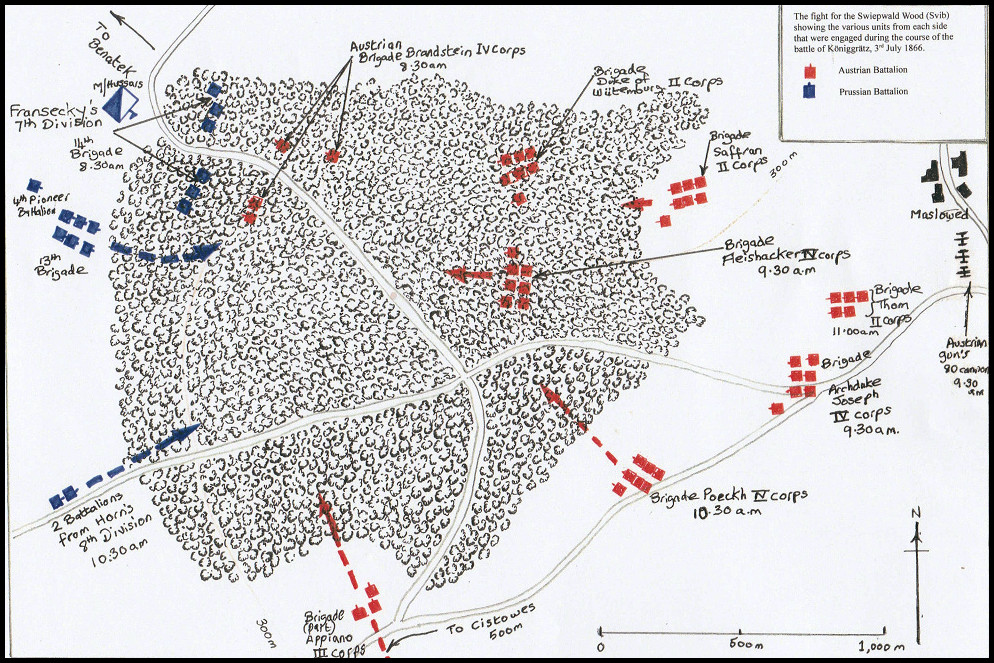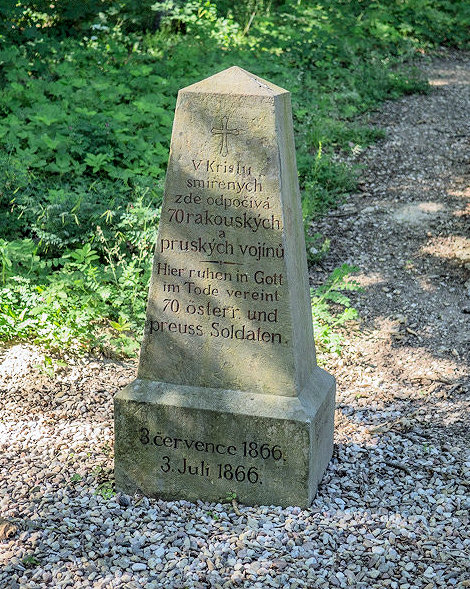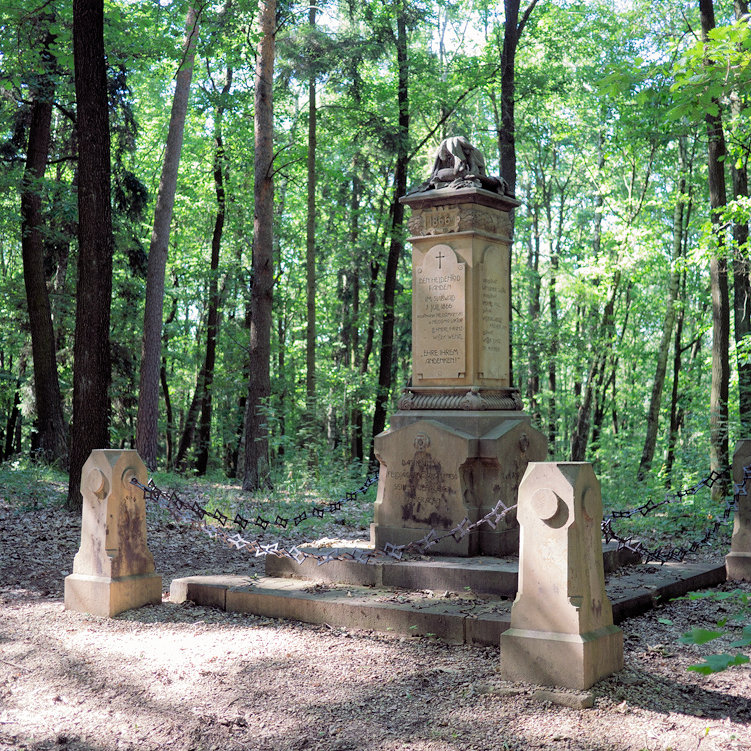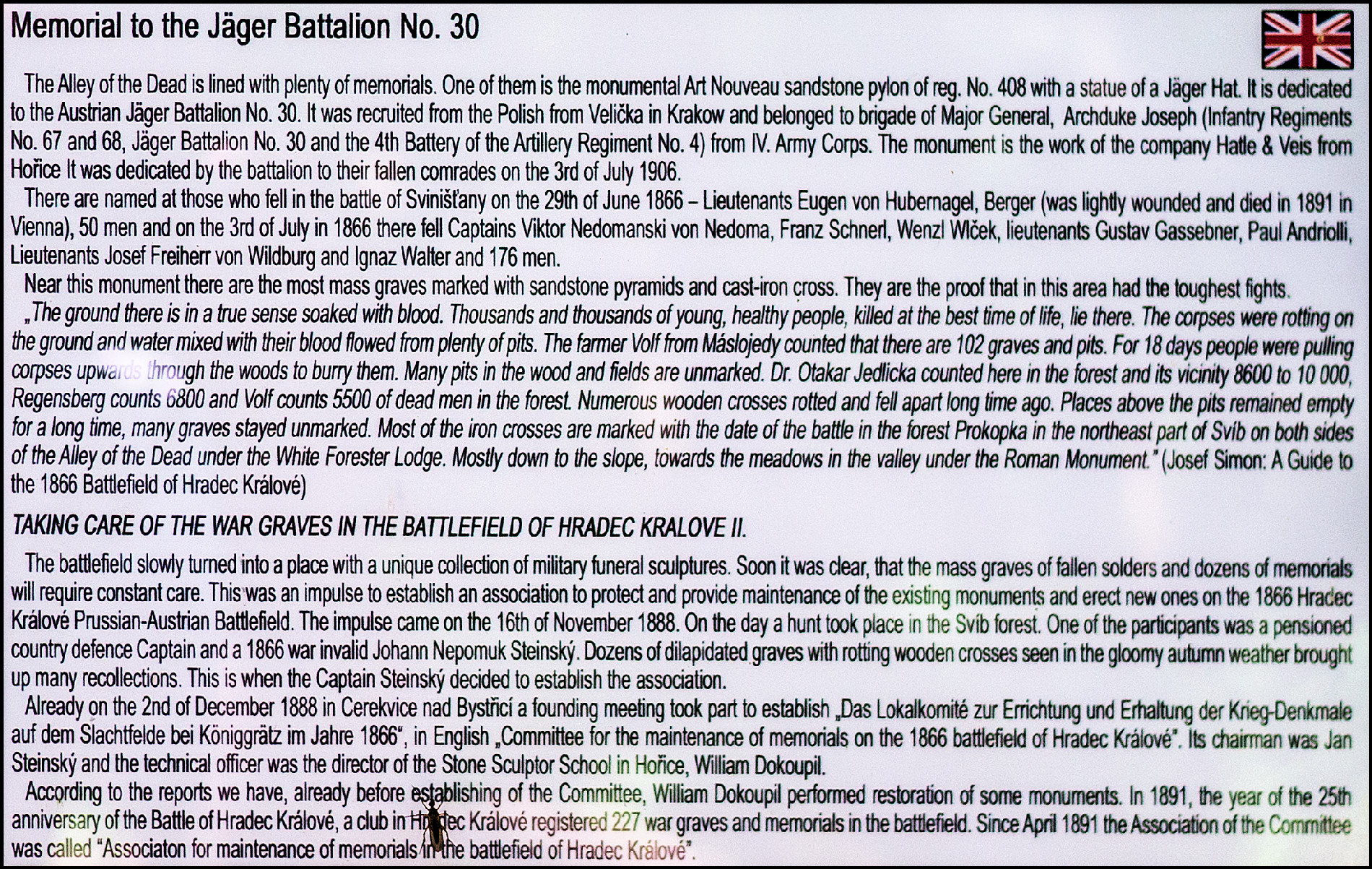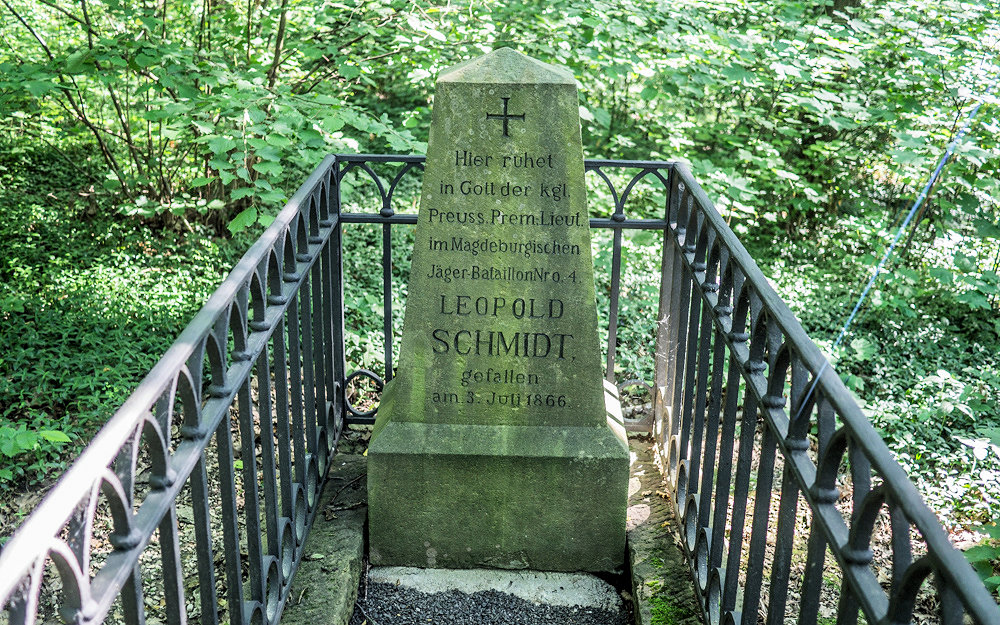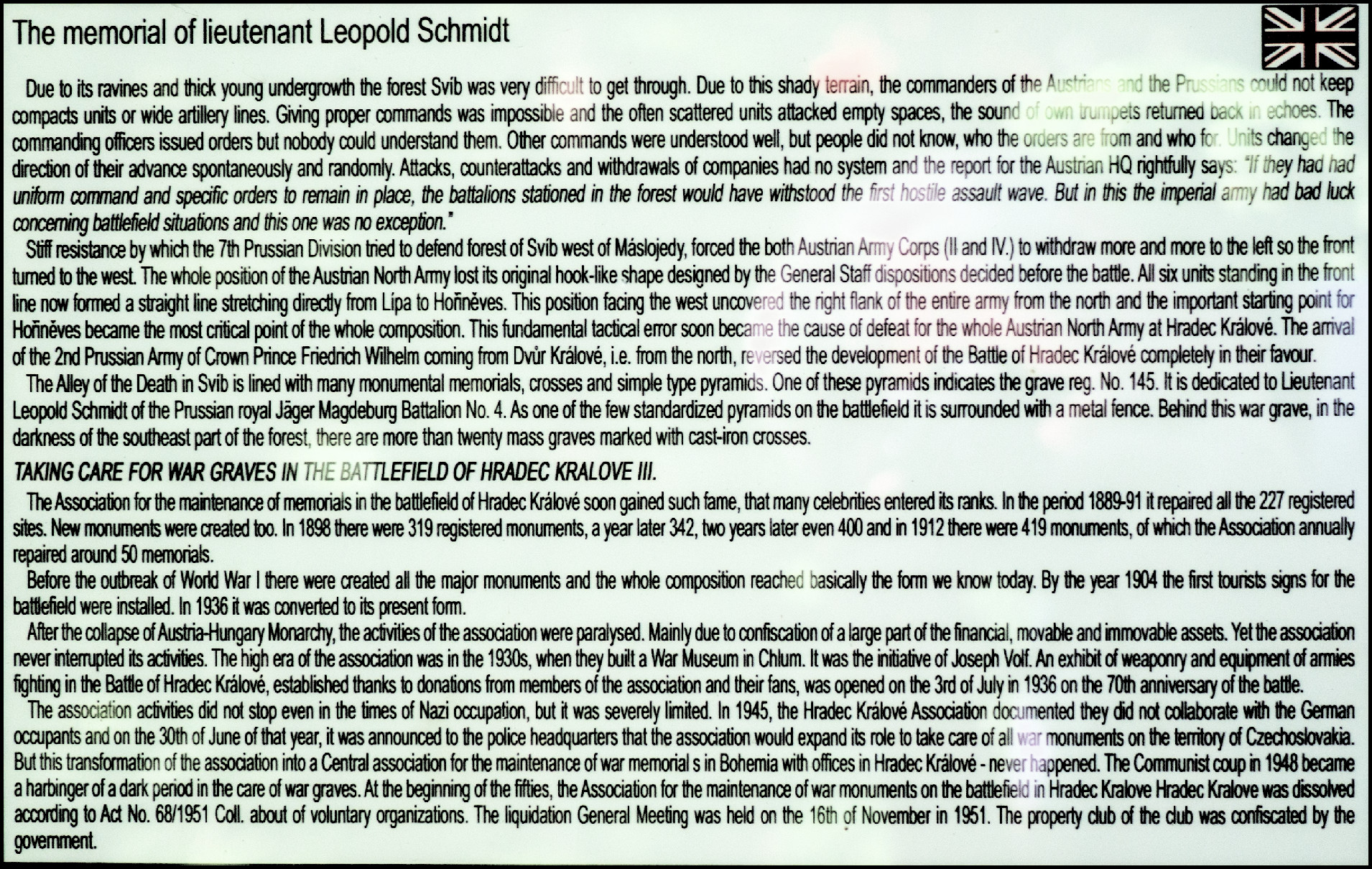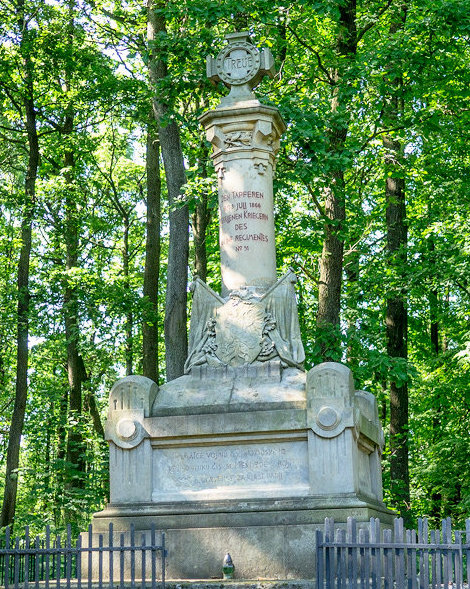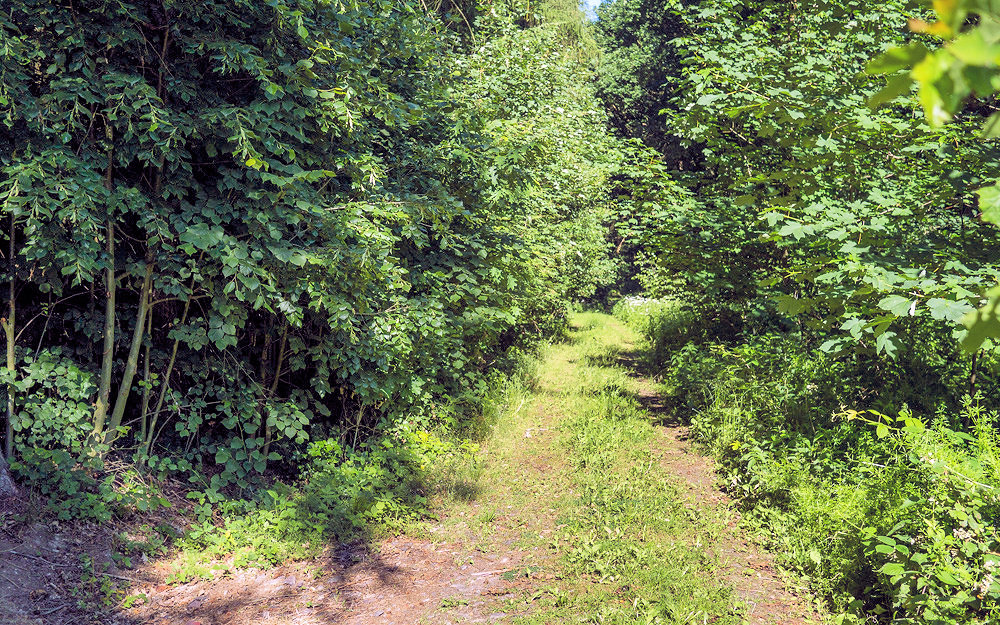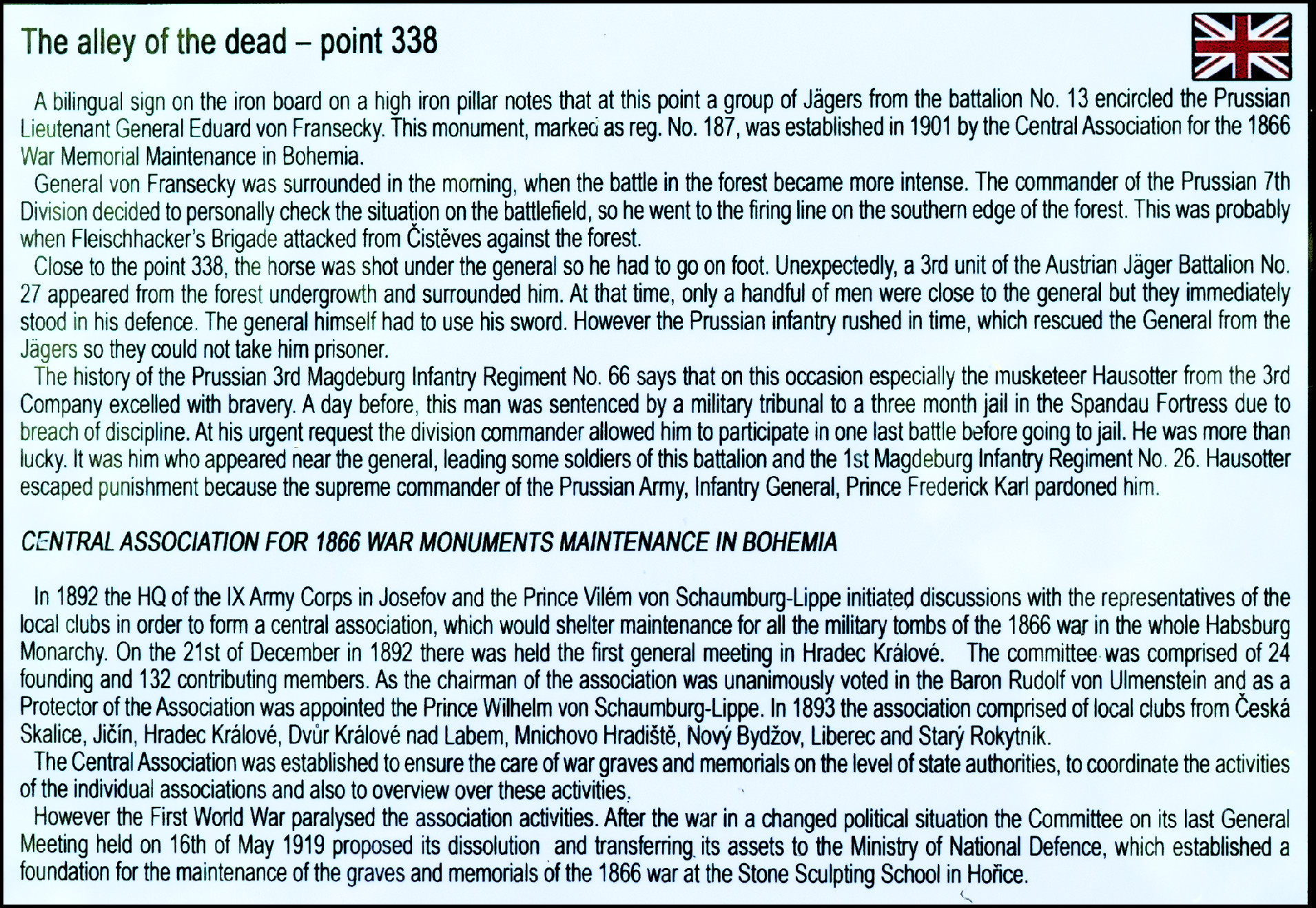The following account of the fighting that took place in and around the Sweipwald Wood (now the Svib Wood) is taken from the official Department of Military History of the Prussian General Staff of the Campaign of 1866. Translated into English by Colonel von Wright and Captain Henry M.Hozier (Reprint 1907).
Having visited the wood myself along with Dr Robert Series, when we toured the whole battlefield of Königgrätz in 2014, I am still amazed at the actual bitterness of the fighting, as well as the massive casualty figures sustained by both sides, but in particular by the Austrians, and the disposal of the bodies of the slain after the battle. Therefore, as well as the actual details concerning the struggle for control of the wood, I have also included photographs and some of the battlefield notice board details from around the site, which seems to contain almost a monument or a marker at every village, road junction and farm track.
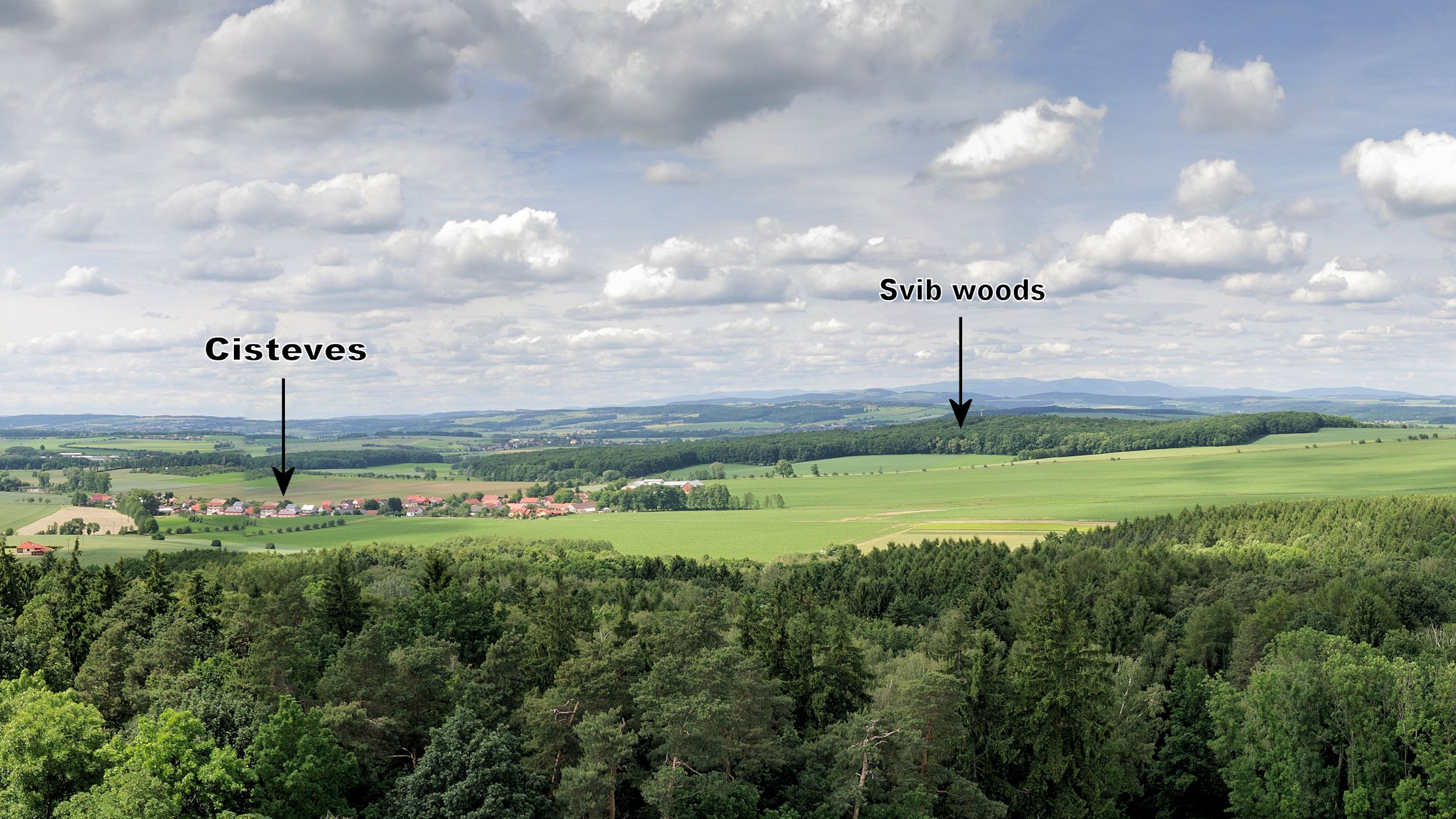
The Fighting in the Swiepwald Wood.
…The two Fusilier Battalions of General Fransecky’s advance guard (Colonel von Zychlinsky) were reinforced by the 1st and 2nd Battalions of the 27th Regiment (14th Brigade Major-General von Gordon) which General Gordon spread out to the right of and on the same line with them. With these four battalions the General then proceeded to attack the wood of Maslowed [Swiepwald], which was apparently occupied in force, although Major von Hymmen (10th Hussars) reported that four more battalions of the enemy had just entered the wood from the direction of Maslowed.
The Austrian Major-General von Brandenstein had in fact moved forward the main body of his brigade from its bivouac south-east of Maslowed, to support both wings of his line of outposts. Two battalions of the 12th Regiment (Archduke William) took the northerly direction; the 3rd Battalion of that regiment, and that of the 26th Regiment (Grand Duke Michael) advanced southwards of the village, where the battery of the brigade unlimbered.
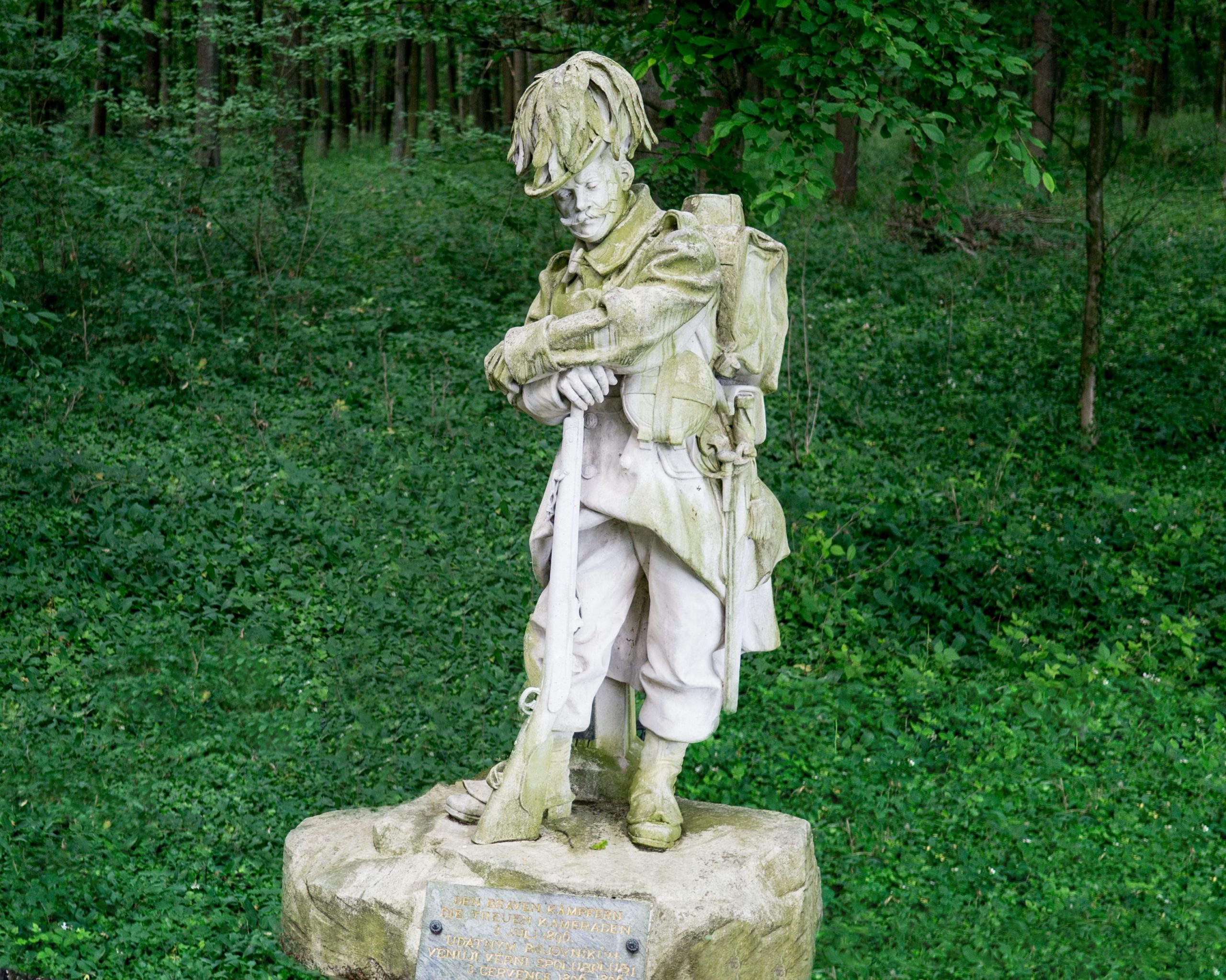
The wood of Maslowed (otherwise called Swib or Wobora [the Swiepwald, now the Svib Wood]) was not distinctly marked on the maps, so that its extent and depth were unknown. From east to west it is about 2,000 [paces], from north to south about 1,200 paces long.[1]The ridge which it covers is very steep and difficult to access from the north, on which side it is intersected by numerous ravines; towards the Bistritz [River] its fall is more gradual. The south-eastern slope of the hill, almost as far westward as the road leading from Cistowes to Benatek, is [was] covered in oak scrub, in which there were at times numerous piles of stack-wood. The triangular part of the wood westward of this road, and northward of the road which descends the hill from east to west, as well as that part of the wood farthest east which juts out like a bastion towards Horenowes, was of similar kind. All the rest of the wood consisted of high timber, partly with or without undergrowth.
It was about half-past 8 when General Gordon’s four battalions advanced against the wood. The main body of the 7th Division was ordered to deploy in a dell to the north of Benatek, and the reserve was to follow to the same spot.[2] The 1st Squadron of the 10th Hussars was dispatched to the right to open communications with 8th Division (Horn). The three other squadrons of the regiment covered the left flank.
Lieut-Colonel Weigelt, of the Artillery, brought up the 4th 12-pounder battery [smooth bore?] under Captain von Notz to the east of the height, close to the eastern side of Benatek. The 1st 6 –pounder [smooth bore?] battery under Captain Kühne followed across the meadows, and opened fire to the left of the former battery, somewhat in its rear. Both batteries, however, were soon compelled to fall back behind the meadows by large bodies of skirmishers that pressed forward from Horenowes, and fired on their left flank. The 12-pounder battery suffered some loss, and had one gun dismounted. Lieut-Colonel Weigelt now led the 5th 4-pounder battery under Captain von Nordeck through the village, to support the attack of the Infantry; two guns of the battery unlimbered on the south, the other four on the east side of and close to the village. The two above-mentioned batteries, that had been obliged to withdraw, afterwards came to the same spot, and directed their fire principally against the massive building [large barn?] in front of Maslowed. With the exception of a few immaterial changes in positions, the batteries remained on these spots as long as the engagement of General Fransecky’s Division lasted.
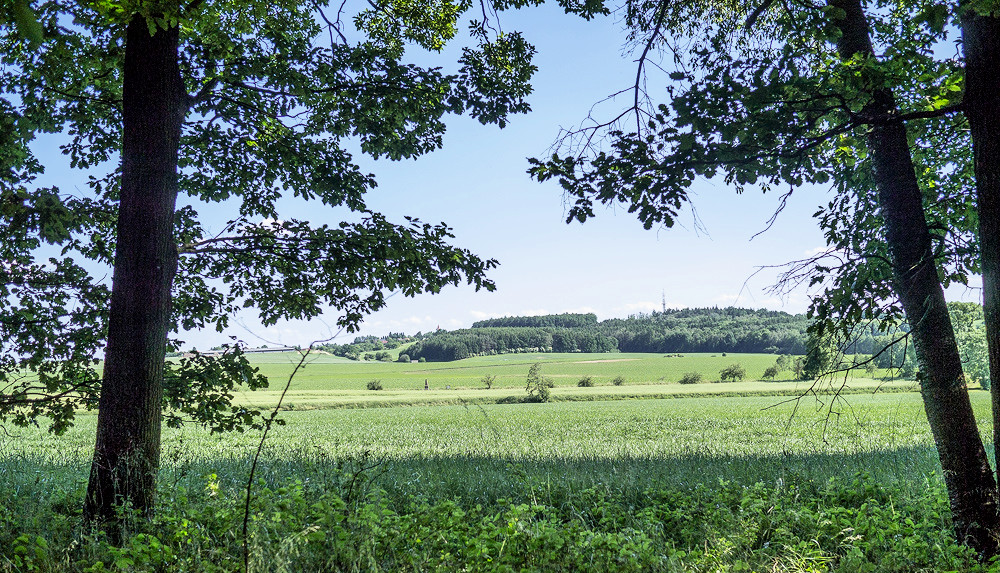
The enemy did not hold his ground at the skirts of the wood, but fell back, for the most part towards Cistowes. The battalions therefore followed into the interior of the wood,-namely, on the right wing the 1st Battalion of the 27th Regiment, through that part of the wood which projects westwards; the 2nd and Fusilier Battalion of the same regiment on and at the side of the road leading to Cistowes; lastly, on the left wing, the Fusilier Battalion of the 67th Regiment to the northern part of the wood, which projects like a bastion.
In the meantime the IV Austrian Corps was advancing in this direction to take up position between Maslowed and Chulm, and had sent two Horse Artillery batteries, one 4-pounder, and the Rocket Battery of the Reserve Artillery of the corps, on ahead to cover this movement. The Rocket Battery was planted in Maslowed, the other batteries by the side of the village, so that 40 guns of the IV Corps played upon the Prussian battalions during their advance. In vain did the 18 Prussian guns attempted to draw the fire off from the infantry; they were 3,500 paces off, and in the dull weather all they could do was to aim at the flashes of the enemy’s guns.
As soon as the 27th Regiment entered the wood at the right wing, the enemy’s guns, which were firing in this direction, gradually increased their fire until it attained an uncommon degree of vehemence. The connection between the different battalions was lost in climbing up the steep and wooded declivities, and the enemy’s Riflemen and Infantry skirmishers gave way but slowly. However, the battalions succeeded in pressing forward to the other side of the wood, though not without losing officers and men.
In commencement of the action they had been encountered by detachments of the left wing of General Brandenstein’s outposts – 2nd Battalion of the 26th Infantry Regiment (Grand Duke Michael) and part of the 27th Rife [Jäger] Battalion – and, as the engagement proceeded, probably also by part of the 4th Rife Battalion, of the 2nd battalion of the 62nd Regiment (Archduke Henry), belonging to the III Corps, which advanced from Cistowes, and by the 1st Battalion of the 46th Regiment (Saxe- Meningen). The left wing of the Prussian 27th Regiment then came in contact with the 3rd Battalions of the Austrian Regiments (Grand Duke Michael and Archduke William, Nunbers 26 and 12), which Major- General von Brandenstein and pushed forward to the south of Maslowed.
The 1st Battalion of the 27th Regiment had only to pass through part of the wood, so that it was the first to reach the open country beyond, and then turned towards the Cistowes hill. The Commander of the battalion (Lieut- Colonel von Sommerfield) fell, and Captain Schramm took his place. In the interior of the wood Lieut-Colonel von Zychlinsky himself directed the movements of the different detachments which were scattered over the ground in single columns or companies. The enemy was repeatedly driven back at the point of the bayonet, and all pressed forward, even if only to get out of the fearful shelling.
As soon as it was reported to the Colonel that the 1st Battalion was in possession of the corner of the wood towards Cistowes, he led the 2nd Battalion (Major von Busse) to the same spot, where he found the 9th Company (Captain von Buddenbrock) ensconced behind a bank of earth in front of Cistowes, and the 8th Company (Captain von Kretschmann) at the south corner of the wood. Sharp skirmishing now commenced at the skirts of the wood, whilst those Austrian detachments that still held their ground in the interior of the wood kept up a continual fire there also. Colonel von Kychlinski’s horse was shot under him; Captains von Kretschmann and von Bunddenbrock were wounded.[3]
In the meantime the Fusilier Battalion of the 67th Regiment (Lieut-Colonel von Buttlar) had pressed forward on the left flank to the detached part of the north-eastern projection of the wood, where it was immediately engaged in a severe struggle with the 27th Austrian Rifle [Jäger] Battalion. The infantry battalions which General Brandenstein sent forward came too late to save this part of the wood. An attempt they made to retake it was repulsed by the rapid file-fire of the Prussian Infantry, but the enemy still held the steep slope southwards of it. In consequence, the Fusilier Battalion (Lieut-Colonel von Schmeling) and the 1st Battalion (Major Schwager) of the 66th Regiment were sent forward from the main body of the division. Their concentric attack drove the enemy’s Riflemen out of the scrub-oak, and repulsed repeated attacks of some Austrian reinforcements which had arrived. In this manner the Prussians gained possession of the greater part of the Maslowed (Swiep) wood, but were not able to occupy the whole line of outskirts on the opposite side of it, because of the great extent of the wood and the fierce struggle that was raging in parts of its interior.
These first successes of the 7th Division were, however, destined to be seriously endangered, and the struggle for the possession of the wood of Maslowed (Swiep) assumed momentarily increasing dimensions; for, even when the very first detachments of General Brandenstein’s Brigade were being driven out of it, the main body of the IV Austrian Corps and the head of the II Austrian Corps were already approaching the scene of action, and then instantly joined in the combat.
The first part of the IV Corps that arrived was General Fleishhacker’s Brigade; it was despatched to the immediate assistance of General Brandenstien’s left wing. The battery of the brigade took up a position near Maslowed; the Infantry formed in two lines and advanced on Cistowes; but detached the 13th Rifle (Jäger) Battalion into the wood on the right.
At this part of the field the left wing of the Prussian 27th Regiment had not yet reached the skirts of the wood, but was still fighting in the interior. The right wing, on the contrary (the 1st Battalion), was already pushing on towards
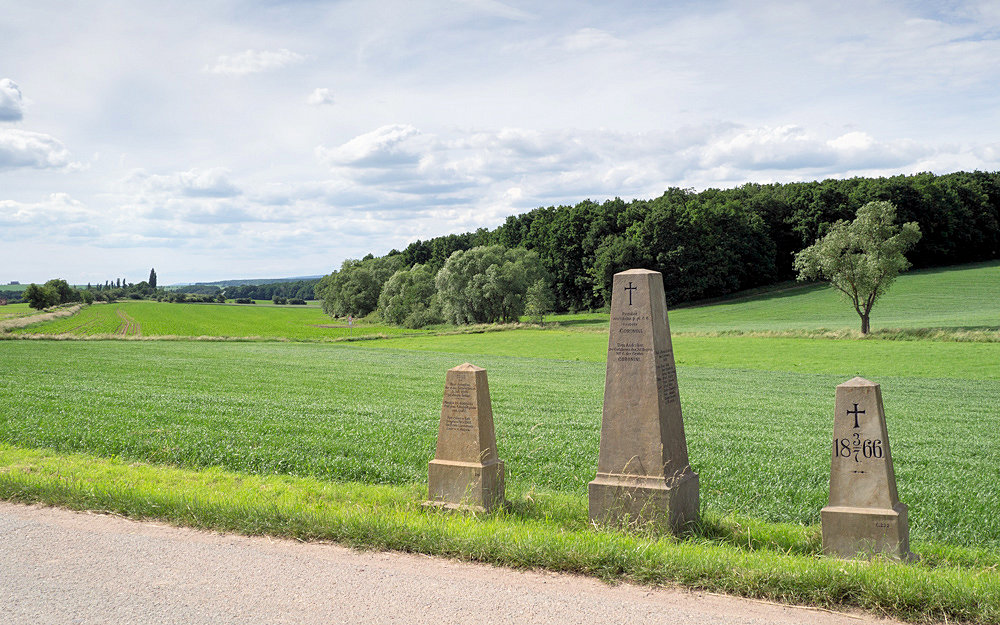
This village was occupied by two battalions of the Austrian 62nd Regiment (Archduke Henry), belonging to the III Corp and by detachments of the 4th Rifle (Jäger) Battalion; but the 1st Battalion of the Prussian 27th Regiment nevertheless gained possession of the buildings which lie in front of the west side of the village, and the 2nd Battalion penetrated into the village itself from the north, and drove the enemy out. By degrees the Fusilier Battalion (Lieut-Colonel von Zedtwitz) also issued from the wood, the 11th Company joined in the fight at Cistowes, the guidance of which had been taken by General von Gordon and Colonel von Zychlinski.
Now, however, as General Fleishhacker’s six battalions drew near the village, the Austrian detachments that had been driven out of it again advanced.
The shock of this overwhelming mass fell full upon the left flank, and, at the wood, even upon the rear of those Prussian companies that had pushed farthest forward. They were driven back in different directions. Lieutenants von Schrœder and von Hanstein, that were the farthest ahead with their skirmishers, were cut off and taken prisoners. The 6th and 7th Companies were thrown back towards the south-west, and were obliged to retreat to Sadowa wood (Holowald?); they were afterwards employed as support for the artillery at the Skalka wood(?) The 5th Company fell back on the buildings that were occupied by the 1st Battalion. The 8th Company lost its officers, their substitutes, and the Sergeant-Major of the company. The Captain of the 1st Company (Count Finkenstein) had fallen, and parts of his company that were at this spot, and the 8th Company, were scattered, and retreated, partly to the wood of Maslowed (Swiep), and partly to that of Sadowa. Though perfectly isolated, the 1st Battalion, and those detachments that had joined it still kept up their fire against their far more numerous adversaries on the west side of the village.
General Fleischhaker now occupied the skirts of the village, and held a strong force in reserve behind it. The remainder of his brigade followed the Prussian detachments through the Maslowed (Swiep) wood, and there continued the fight.
The Commander of the Austrian IV Corps, General Count Festetics, was severely wounded in these combats (his left foot was shattered by a shell), and General Mollinary, (Festetics assistant according to OOB. Colonel von Görz was Chief-of-Staff) took command of the corps in his place. General Count Thun, Commander of the II Corps, had also suffered a contusion of the head.
The horses of General Fransecky and his aide-de-camp were shot, as they were approaching the ravine at the north-eastern corner of the wood, by some Austrian Riflemen that were hidden by the corn. The General then passed the ravine on foot, and advanced to the foremost line of skirmishers to reconnoitre his adversary’s position, when he suddenly found himself in the midst of the enemy’s Riflemen. Some twenty Prussians that were cut off from their corps [units] rallied around him, and by their assistance he succeeded in regaining his battalions.
Even before this took place the Quartermaster-General of the I Army, General von Stülpnagel, had arrived with instructions from Prince Frederick Charles not to extend the line too far to the left.
It may have been about half-past 9 when the two last brigades of the Austrian IV Corps (Poeckh and Archduke Joseph) appeared on the field, so that the 6 Prussian battalions were now opposed to 28 Austrian battalions, behind which, and in their immediate neighbourhood, 14 more battalions of the Austrian IV Corps and two of the VII Corps were stationed. 18 Prussian rifled guns were in fire against 96 of the enemy.
Nineteen more battalions of the Austrian II Corps now arrived on the field. We have already heard that this corps had moved to the left from the Trotina (stream) to keep in connection with the IV Corps. [4]
Colonel Thom’s Brigade reinforced the battalion of the 69th Regiment (Count Jellacic), which was stationed southwards of Racitz, with a second battalion of the same regiment, and then marched towards the park (Fasanerie[pheasantry]) of Horenowes. Prince Würtemburg’s Brigade advanced to the left of the former, and General Saffran’s Brigade in the direction of Maslowed.
Colonel Thom occupied Horenowes with a division (company/section?) of the 40th Regiment (Rossbach), and the park south of the village with the 2nd Rifle (Jäger) Battalion. The battery of the brigade, and the 5th 4-pounder battery of the Reserve Artillery of the corps which was attached to it, opened fire.
Prince Würtemburg’s Brigade deployed in two lines between Maslowed and the park of Horenowes, and dispatched the 20th Rifle (Jäger) Battalion to the assistance of the right wing of General Brandenstein’s Brigade. When the Rifles arrived there they found the battalions of the latter brigade, that had been sent against the north-eastern part of the Maslowed (Swip) wood, in full retreat, and the Brigade Würtemburg received orders to prevent any further debouche of the Prussians from the wood. A very severe skirmishing fire now ensued between the brigade and the Prussian detachments on the opposite side, which had been reinforced by the main body of General Schwarzhoff’s Brigade. At the request of the IV Corps, Prince Würtemburg detached two battalions of the 47th Regiment (Hartung) to occupy Maslowed. The 4th 4-pounder battery, two Horse Artillery batteries, and the rocket battery of the Reserve Artillery of the corps, came into action in front of the brigade.
Under these circumstances the utmost exertions were necessary on the part of the Prussians to keep possession of the Maslowed (Swiep) wood, and by degrees all the battalions of the 7th Division were brought forward in this direction.
The advance of Prince Würtemburgs’s Brigade had already obliged General Schwarzhoff to send forward the last four battalions of the main body – the 26th Regiment (Colonel Von Medem), and the 2nd Battalion of the 66th Regiment (Colonel von Blankensee).
The position of these four battalions during their advance was one of very great difficulty.
On the right wing the Fusilier Battalion of the 26th Regiment (Major Löwenbereger von Schönholz) entered the wood and reached the crest of the hill, but could not penetrate to the detachments of the 27th Regiment that were engaged in front of Cistowes.
The 1st Battalion of the same regiment crossed the summit of the hill in the wood to the left of the Fusiliers, and had almost gained the south-eastern skirt of the wood when it was met by the fire of some masses of enemy troops that were crowded together at that spot. Major Paucke, whose horse had been shot, placed himself at the head of the 2nd and 4th Companies (Captain von Westernhagen and von Horn) and led them on foot to the charge. The former officer, though wounded, did not withdraw from the fight, which surged to and fro for some time. The two companies even that were kept back in reserve were so severely shelled, in particular by two guns on their left flank, that they were withdrawn into the high timber to the rear, suffering heavy losses.
At last the 2nd Battalion of the regiment (Major von Gilsa) succeeded in driving the Austrian detachments from the steep northern slope, then wheeled to the left, and occupied the skirts of the wood in front of Maslowed, where it however came into the full force of the Austrian artillery fire, which struck down whole ranks of the battalion. About 10 o’clock Austrian detachments appeared on its left flank. Though wounded several times, and obliged to be supported by a bandsman, Major von Gilsa led three companies to meet them, and did not quit the field until perfectly exhausted. He then took leave of his men, thanking them for their conduct, and died a few days later.
On the left wing Major Wiedner advanced along the northern skirts of the wood with three companies of the 2nd Battalion of the 66th Regiment, in doing which he lost four officers. He reached the corner of the wood that juts out farthest towards Maslowed, to the left of the 2nd Battalion of the 26th Regiment, then advanced in line against the Austrian columns on the hill north- eastwards of the wood, and poured several volleys into them, but was forced to fall back to the skirts of the wood by heavy fire of shell and musketry from his right rear.
On the right wing Major-General von Gordon had also been obliged to order up the two battalions of the Reserve – the 1st and 2nd Battalions of the 67th Regiment, the latter battalion only numbering three companies. He sent these troops, under Colonel von Bothmer, to the assistance of the 27th Regiment, and requested the 8th Division (General von Horn), which was at that moment marching past the Skalka(?) wood, to afford him still further aid. In consequence of this request, General von Horn sent the 1st Battalion of the 72nd Regiment (Major von Hänsel) and the 4th Rifle Battalion (Lieutenant- Colonel von Colomb) to the Maslowed (Swiep) wood. Colonel von Bothmer joined in the action somewhat after 9, the battalions of the 8th Division somewhat after 10 o’clock. By this time all 12 battalions of the 7th Division were engaged. Inclusive of the two battalions of the 8th Division, 14 battalions and 24 guns were the whole force with which a struggle had to be maintained, which was becoming fiercer and fiercer every minute.
Colonel von Bothmer advanced on and by the side of the Benatek- Cistowes road with two battalions of the 67th Regiment, but was obliged to cover his left flank by throwing out skirmishers against the Austrians that were still in the interior of the wood, and with whom a brisk fire was kept up. On reaching the southern skirts of the wood he found parts of the 27th Regiment engaged with detachments of the brigades of Fleischhacker, Brandenstein, and Appiano. The arrival of the Prussian reinforcements brought the action to a standstill at this spot.
At first starting, two of Colonel Bothmer’s companies had taken the direction of Maslowed. The (Austrian) Brigade Würtemburg and the detachments of Brigade Brandenstein gained scarcely any ground by their attacks in this quarter, but a fierce struggle was still being carried on in the interior of the extensive wood and in the rear of those battalions that had pressed forward to its skirts.
The Prussian companies in this part were fighting singly, and without any connection with each other, and the powerful detachments of the enemy even succeeded in regaining the western skirts of the wood, and actually crossed the tract over which Colonel Bothmer had marched shortly before them. It came so to pass, that when the two battalions of the 8th Division reached the western skirts they found them occupied by the enemy in force, and had first to dislodge their opponents; a few hundred paces further on they fell in with the skirmishing parties of the 27th and 67th Prussian Regiment in the interior of the wood.
In the eastern part of the Maslowed (Swiep) wood also General Brandenstein’s battalions and the Rifle (Jäger) Battalion of General Fleischacke’s Brigade kept continually loosing ground; General Mollinary, therefore, now sent forward Colonel Poeckh’s Brigade too. Archduke Joseph’s Brigade was stationed as reserve behind it on the Maslowed- Chlum road, and the two 8 –pounder batteries of the Reserve Artillery came into action by the side of Maslowed. In addition to this, the II Corps was requested, “to execute an offensive movement against the Prussian left flank in order to disengage the troops fighting in the wood, and as much as possible, to obtain possession of the latter, and to force the enemy to retreat.
General Count Thun acceded to this request, and an attack of Colonel Poeckh’s Brigade now commenced at half-past 10 o’clock, which was followed by one of the II Corps further to the right. The 8th Rifle (Jäger) Battalion was at the head of the brigade, the first line of which consisted of the 51st Regiment (Archduke Charles), the second of the 37th Regiment (Archduke Joseph), the battery was brought into line with the artillery already engaged (near Maslowed). The two battalions of the VII Corps followed on the left flank of the brigade, and the 30th Rifle (Jäger) Battalion of Archduke Joseph’s Brigade advanced on the right flank.
General Saffran’s Brigade of the II Corps was the one destined to commence the attack, and the Prince of Würtemburg’s Brigade was to advance at the same time.
The 11th and 20th Rifle (Jäger) Battalions took the lead; they were followed by the 3rd Battalion of the 64th Regiment (Saxe-Weimer), and at the right of the latter by two battalions of the 47th Regiment (Hartung), and two companies of the 2nd Rifle (Jäger) Battalion.
To support this attack a column was formed out of the remaining battalions of both brigades; it consisted of three battalions of the 80th Regiment (Holstein), three of the 57th Regiment (Mecklenburg-Schwerin, and one of the 60th Regiment (Saxe-Weimar). The battery of the Brigade Saffran joined with the artillery already in action.
Colonel Poeckh’s attack was directed against the south-eastern corner of the wood, where the Austrians still held the most ground; somewhat later General Saffran’s Brigade and the reserve column advanced against the north-eastern part of the wood also.
The main forces of Colonel Poeckh’s Brigade came in contact with the 1st and Fusilier Battalion of the 26th Regiment, the Fusilier Battalion of the 27th Regiment, and the 2nd Company of the 67th Regiment. These troops had only partially gained the skirts of the wood, and were still hotly engaged with detachments of the Brigades Fleischhacker and Brandenstein, but the charges of the Austrian line was nevertheless repulsed, and almost all leaders of regiments and battalions put hors de combat. The charges of the second line, however, succeeded, and the Prussian battalions were driven back in various directions. Colonel Poeckh’s left wing, on the other hand, met Colonel Bothmer’s detachments, which had already repulsed several attacks of General Fleischhacker’s battalions, and which had, whilst in pursuit of the enemy, pressed on beyond the strip of meadow land, and as far as the avenue of plum trees to the north of Cistowes. Colonel Bothmer was now met by severe infantry fire in front, while at the same time his line was enfiladed by one of the enemy’s batteries, and strong hostile columns menaced his left flank. Lieutenant-Colonel von Zedtwitz led the supports, that had been left at the meadow, against the latter and drove them back, but soon received so severe a fire from the wood in his rear that he was not able to maintain his position. The supports were driven back into the wood as far as the road leading from Maslowed along the crest of the hill; Colonel Bothmer, although almost entirely cut off, still remained with the 1st, 6th, and 7th Companies of the 67th Regiment in front of Cistowes, and kept up a very sharp fire against the villages. General von Gordon and Colonel von Zychlinski still held their ground in the buildings westward of Cistowes and in the meadows leading down to the Bistritz (river) with the 1st and parts of the other battalions of the 27th Regiment. The General and all the mounted offices lost all their horses, Colonel Zychlinski was wounded and the battalions were very much diminished, but they still kept up the combat with the strong garrison of the village.
Lieutenat-Colonel Weigelt’s batteries played upon the Austrian II Corps during its advance; they were still in the same positions in front of the village of Benatek, which have already been described.
General Saffran’s first attack on the eastern part of the wood was repulsed; that of the reserve column, which had to cross the open country, totally failed. The Austrians suffered severely, especially the 80th Regiment (Holstein); a flank movement against the Prussian batteries was frustrated by the 10th Hussar Regiment. The progress which Colonel Poeckh’s Brigade made on the flank and rear of their position was however, very soon felt by the defenders of the wood, and they were driven back into the north-eastern part of the wood.
It was now 11 o’clock; 40 Austrian battalions had been already engaged in the struggle; 11 were still in reserve.
128 Austrian guns had opened fire on the Prussian troops; 24 more were at hand, namely the battery of Archduke Ernest’s Brigade and the two 8 –pounder batteries of the Reserve Artillery of the II Corps. General Brandenstein’s Brigade was in the act of reforming behind Colonel Poeckh’s Brigade. The Austrians had gained possession of the greater part of the wood, but still could not succeed in completely wresting from General Fransecky’s 14 battalions and 25 guns the ground which had been conquered at so great a sacrifice and defended with so much devotion.
Certainly, so great a numerical superiority might prove very dangerous to the 7th Division-might even lead to its destruction, but even in the latter case, the issue of the battle would have been considerably influenced by the firmness with which this single
Division had held two corps d’armée of the enemy at bay, and had, by engaging their forces itself, drawn them away from their proper destination….
Here the narrative breaks off from the fighting in and around the Swiepwald Wood and commences to deal with details of the battle on other sections of the field. We pick up the action again at 11 o’clock.
…We left General Fransecky at 11 o’clock, as his adversary had penetrated into the wood with far superior forces, and had driven back the centre of his division, thereby totally separating both wings.
In the south-eastern part of the wood the whole force of this mighty attack fell on the worn out Fusilier companies of the 27th Regiment and the 1st and Fusilier Battalion of the 26th Regiment. In vain these troops exerted their utmost energies to hold their ground. The Fusilier Battalion of the 27th Regiment had suffered severe losses in previous moments of the engagement, in the attacks which different detachments of the regiment had made on Cistowes, and on the enemy’s artillery; Captain Count Finkenstein had fallen, Captain von Westernhagen, and many of the officers were severely wounded.
The commandant of the Fusilier Battalion of the 26th Regiment, major von Schönholtz, was wounded, the leader of the 11th Company, Lieutenant Ewald, dead, and six officers hors de combat.
Parts of the 1st Battalion of the 26th Regiment, Major Paucke, under Captains von Westernhagen and von Horn, twice pressed forward from the summit of the hill to the skirts of the wood, but their attempts cost the battalion its commandant, Captain von Westernhagen, five officers, and more than 200 men. The numerical superiority of the enemy was so great that the thinned ranks of the Prussians could no longer hold their ground; they were driven back partly to the northern projection of the wood, where the 2nd Company of the 67th Regiment, which now joined in the action, also repaired, and partly in the direction of Benatek.
The General Staff Officer of the Division, Major von Krenski, rallied some of the detachments, and led them forward again, others occupied the village. The 12th Company of the 27th Regiment formed the nucleus of these troops, and Major Paucke soon arrived with such debris of his battalion as were still with him.
The 4th Battalion of Rifles and the 1st Battalion of the 72nd Regiment still held their ground in the western part of the wood, but here also they were partly forced out into the open country, as was also Major von Zedtwitz, with the 8th Company of the 67th Regiment. In this struggle, in which waved to and fro, Sergeant Müller and Private Bässler of the 2nd Company of the 72nd Regiment captured an Austrian flag, a second was taken by Private Köhler of the Rifles, but lost again when he was wounded.
Whilst the Prussian troops still made good their footing in this part of the wood, the Austrians gained more and more ground in other directions. The defenders of that part of the wood that juts out towards Maslowed, were thus placed in an extremely difficult position; engaged in the interior of the wood, they were vehemently attacked from the direction of the village, and thereby menaced in front, flank, and rear at the same time.
At this spot the 2nd Battalion of the 26th and 66th Regiments, and the 3rd and 4th Companies of the 67th Regiment were engaged. After Major Gilsa’s mortal wound, Captain Fritsch made a successful attack on an Austrian battalion of rifles (Jäger), with the 6th and 7th Companies of the 26th Regiment. Captains von Pollern and von Ploetz still held the road which leads into the wood from the south end of Maslowed with the 5th and 8th Companies of the same regiment, but the latter lost 2 officers, 8 non-commissioned officers, and above 80 men of his company. As, however, the enemy encompassed these detachments more and more, they were compelled to fall back to the northern part of the wood, disputing the ground step by step. Major von Wiedner alone succeeded in maintaining his position at the front of the hill, where the road from Maslowed touches the corner of the wood, with three companies of the 2nd Battalion of the 66th Regiment. Austrian rifles (Jäger) that had entered the wood at this spot were driven out again, and three different attacks of the enemy repulsed.
In the meantime the battalions of the Austrian II Corps had also begun to advance against the northern projection of the wood. Here also an incessant struggle had be going on, but all exertions of the enemy were thwarted by the steadiness of the Prussian troops stationed here.
The companies had all become mingled together as the fight swayed backwards and forwards in the dense wood; no unity of guidance was possible on the ground where hills and wood shut out all view from the surrounding country, and all that commanders could do, was to lead their men by their own personal example. In all parts the officers rallied around whatever men were in the neighbourhood, no matter to what regiment they belonged, and led them forward again and again.[5] Troops that were driven out of the wood were sent back again into it, the debris of these detachments which were too far reduced in numbers were posted as reserves. It is true that the numerous Austrian prisoners were still being continually brought back, but the numbers of wounded streaming to the rear, and of troops that had lost their leaders, was also increasing more and more. Behind them now appeared the enemy skirmishers, and compact Austrian detachments soon issued out of the north-west corner of the wood, and advanced in the direction of Benatek.
Nevertheless, the defence of those parts of the wood which projected towards Maslowed was still continued, and it was the aim of the Austrians to wrest this last position from the division. For this purpose strong bodies of troops advanced from the south, and those detachments of Prince Würtemburg’s and General Saffran’s Brigades, which had been previously repulsed, as well as five perfectly fresh battalions of Colonel Thom’s Brigade, which had just arrived from the heights of Horenowes, pressed forward from the east.
At this decisive spot, however, General von Fransecky was personally present, and inspired all around him with the firm resolve to defend to the utmost the ground which had cost so much blood to conquer. He himself, General von Schwarzhoff, Colonels von Medem, and von Blankensee were brilliant examples for their troops. Major von der Burg of the General Staff had already announced the approach of the (Prussian) 2nd Army, and the words “the Crown Prince is coming” flew through the thinned ranks of the defenders, and inspired the nearly exhausted strength of the hard-pressed band with fresh life.
In reality, however this aid was still far off, and the situation became every minute more critical. Major von der Burg was, therefore, requested to arrange that the first available detachments of the Guards should advance on Maslowed against the enemy flank; riding through the line of Austrian skirmishers this officer hastened to the heads of the Guards and the VI Corps. The attempts of the enemy to debouch from the wood in the rear of the Prussian position had for the present to be resisted by the forces of the 7th Division alone.
In the course of the fight in the wood, a battalion of the 51st Regiment (Archduke Charles Ferdinand) had lost all idea of its whereabouts; issuing from the north-west corner of the wood it advanced towards the small copse on the Bistritz (River), in the direction of Horenowes, but was soon seen by Captain von Humbert, who was stationed in the hollow way south-westward of the village of Benatek with the 1st Squadron of the 10th Hussars. The squadron rapidly formed line and charged the enemy. At the first summons to surrender 16 officers and 665 men laid down their arms without resistance. One flag was captured; a second that was at the rear of the battalion, escaped.
Some other detachments of the enemy coming out of the north-west corner of the wood, General Fransecky sent Captain von Ploetz with the 5th and 8th Companies of the 26th Regiment against them. In company with part of the 4th Battalion of the Rifles they also succeeded in surrounding those Austrian riflemen that first came out into the open, and in taking 3 officers and 200 men prisoners.
The arrival of fresh columns of the enemy, however, compelled Captain von Ploetz to fall back eastward of Benatek; Captain Raussendorff’s Battery southwards of that village was also obliged to withdraw. Detachments of the enemy were already pressing forward to attack Benatek, but as troops had been thrown into the village in due time, the former were unable to enter it, and were obliged to retreat again into the wood.
In the meantime the fight at that part of the wood where its north-eastern projection joins the main forest, raged with intense fury. Major Schwager and Lieutenant-Colonel von Schmeling advanced here with the 1st and Fusilier Battalions of the 66th Regiment to cover the retreat of the troops that were retreating from the interior of the wood, as soon as the latter descended the hill. The enemy’s pursuit was checked by repeated charges in which numbers of Austrians were taken prisoners.
The 3rd and 4th Companies of the 67th Regiment, under the command of Captain Ewald, also took part in these engagements. By order of General Fransecky, Lieutenant-Colonel von Hochstetter took up a position with the 2nd Company on the open ground more to the west, in order to prevent the enemy’s debouche from the wood.
Lieutenant-Colonel von Bothmer still held the ground in the extreme north-eastern corner of the wood. The 10th and 11th Companies of the 67th Regiment were twice driven back here. But each time Captain Liebeneiner succeeded in rallying his men and in regaining his former position.
At last it became necessary to withdraw Major von Wiedner too from that part of the wood projecting towards Maslowed, in order to have some available reserve in the hour of need.
Between 1 and 2 o’clock, however, the enemy began perceptibly to relax in his attacks. We know this to have been caused by the mere approach of the Guards and the VI Corps d’Armée, which induced, first the II, and then the IV Austrian Corps also to turn their attention from the attempted destruction of the 7th Division to the preservation of their own army. The orders which were issued in consequence were not however, immediately known by all the Austrian detachments, so that the fight in the wood of Maslowed (Swiep) lasted till half-past 2 o’clock.
During this whole time the right wing of General Fransecky’s Division had held its ground outside of the wood in and near Cistowes. Here too the superior officers, General Gordon, Colonels von Zychlinski and von Bothmer, were in the foremost ranks of the combatants, leading them on their own personal example.
Numerically weak as they were, the Prussian detachments maintained their positions in the western detached part of the village with the utmost steadiness. They were here in the centre of the violent artillery combat between the Austrian batteries on the heights of Lipa, and the Prussian Artillery at the wood of Maslowed (Swiep); this prevented any further advance.
The struggle in which Colonel Bothmer was engaged at the avenue of trees further northward was sanguinary in the extreme; one after the other, Captain von Hirschfeld and four officers were either killed or mortally wounded, and the Austrian columns, which pressed forward in considerable force from the northern outskirts of Cistowes, suffered very severely also by the fire of parts of the 1st, 6th, and 7th Companies of the 67th Regiment that were at this spot. Although wounded, Captain Müller and Lieutenant Vorberg hastened forward in pursuit; the former penetyrated as far as the opposite side of the village, the latter took one of the massively built barns after a severe struggle, but fresh columns of the enemy compelled both of them to relinquish the advantages they had gained, and to fall back to their former positions. Inclusive of the Adjutant of the 2nd battalion, who fell here, the two divisions of the 1st, and the 6th and 7th Companies of the 67th Regiment lost 9 officers and 169 men at this spot, of whom 6 officers and 57 men were killed. In one of the enemy’s attacks Corporal Görlitz and Private Hoebald of the 6th company captured an Austrian flag. Colonel von Bothmer now withdrew these detachments, which were much diminished in numbers and perfectly isolated, but this did not take place until General Fransecky was already engaged in reforming his division.
It was not until now that the entrance of the Guard Fusiliers into Cistowes, which we have already related, released General Gordon’s troops from their critical position.
On the left wing the 2 Companies of the 2nd Battalion of the 66the Regiment under Major von Wiedner had already returned to his position opposite Maslowed, and were on the point of advancing thence against one of the massive barns in front of the village, when detachments of the Guard appeared in the neighbourhood.
The artillery of the division (7th) was brought forward to the heights of Maslowed, and opened fire on the last of the enemy’s retreating columns, but it was above all things necessary to reform the infantry after its hard struggle. General von Fransecky gave orders that this should be done on the meadows south-eastward of the village of Benatek. Fighting with the last troops of the enemy, some detachments of his battalions, and the two battalions of the 8th Division, which had joined him, had regained the opposite side of the wood, where they were able to fire with great effect on the enemy’s retreating masses.
As General Fransecky’s Division had to fight the hardest struggle of this day’s battle, so were its losses also severer than those of any other division.
Exclusive of the artillery, they amounted to 84 officers and 2,036 men, of whom the 26th Regiment alone had lost 26 officers and 709 men. The two battalions of the (Horns) 8th Division, which had taken part in these combats lost 5 officers and 126 men killed and wounded. About 2,000 prisoners and 3 colours were the trophies which remained in the hands of the victors.
It is proved that 51 Austrian Battalions, and more than 100 pieces of artillery (including those at Lipa) were opposed to 14 Prussian battalions and 24 guns. It is not known for certain whether detachments of the III and I Austrian Corps took part in the combat, but one of the captured flags is supposed to have belonged to the 38th Regiment (Haugwitz) of the latter Corps….
The Austrian losses in the fighting in and around the Swiepwald Wood are difficult to estimate for certain, figures for casualties tending to be lumped together for the whole battle. But it is highly probable that their losses in killed, wounded and captured in this area amounted to well over 7,000.
Austrain Units involved in the fighting in the Sweibwald Wood.
| Brigade Brandenstein IV Corps Lt Field Marshall Count Festics. |
|---|
|
12th Infanty Regiment (Archduke William) |
|
Brigade Duke or Württemberg II Corps |
|
47th Infanty Regiment (Hartung) |
| Brigade Major-General von Saffran Corps Lt Field Marshal Thun-Hohenstadt |
|
64th Infanty Regiment (Saxe-Weimar) |
| Brigade Colonel Thom II Corps Lt Field Marshal Thun-Hohenstadt |
|
40th Infanty Regiment (Rossbach) |
| Brigade Flieschacher IV Corps Lt Field Marshal Count Festitics |
|
6th Infanty Regiment (Cronini) |
| Brigade Brandenstein IV Corps Lt Filed Marshall Count Festics. |
|
67th Infanty Regiment (Schemering) |
| Brigade Poeckh IV Corps Lt Field Marshal Count Festitcs |
| 37th Infanty Regiment (Archduke Joseph) 51th Infanty Regiment (Archduke Charles Ferdinand) 8th Field Jäger Battalion |
| Brigade Appiano III Corps Lt Field Marshal Archduke Ernst |
| 46th Infanty Regiment (Archduke Joseph) 62th Infanty Regiment (Archduke Charles Ferdinand) 4th Field Jäger Battalion |
Prussian Units involved in the fighting in the Sweipwald Wood.
7th Division, Lt General Fransecky, Fourth Army Corps, First Army H.R.H Prince Frederick Charles
| 13th Brigade, Major-Genereal Von Schwarzoff |
|---|
|
61st Infantry Regiment |
| 14th Brigade, Major-Genereal Von Gordon |
|
27th Infantry Regiment |
Reinforcements sent by General von Horn
from 8th Division, 1st Army
1st Batallion of the 72nd Regiment (Major von Hansel)
4th Rifle Batallion (Lieutenant Colonel von Colomb)
References
[1] The Svib Wood today no longer has the same dimentions that it had in 1866. That being said the measurements given in older sources in paces, yards and German feet I have disposed of and kept to meters on my own map.
[2] Just what constituted the reserve of the 7th Division is not forthcoming. Since the main body of the division and the advance guard are accounted for then any reserve formations remain a mystery.
[3] Just how the wounded were extracted from the wood is not forthcoming. It would be natural that a senior office would be carried to the rear, but the lesser ranks most probably were either left on the ground until the fighting was over, or tried to crawl or drag themselves out, depending on the seriousness of their injuries. It should be noted that if every wounded soldier needed one or two helpers to take him to the rear than the fighting strength of the various units would be greatly depleted.
[4] II and IV Corps had been moved forward from their prepared positions without Benedek’s knowledge. This re-positioning causing great problems when the Prussian 2nd Army arrived on the field.
[5] The Austrian units were also in the same situation. One must not forget that, with the many diverse languages within the Empire, control and command of many Austrian formations proved very difficult.

